美国文学ThomasJefferson托马斯杰斐逊简短介绍introduction
- 格式:ppt
- 大小:2.94 MB
- 文档页数:22
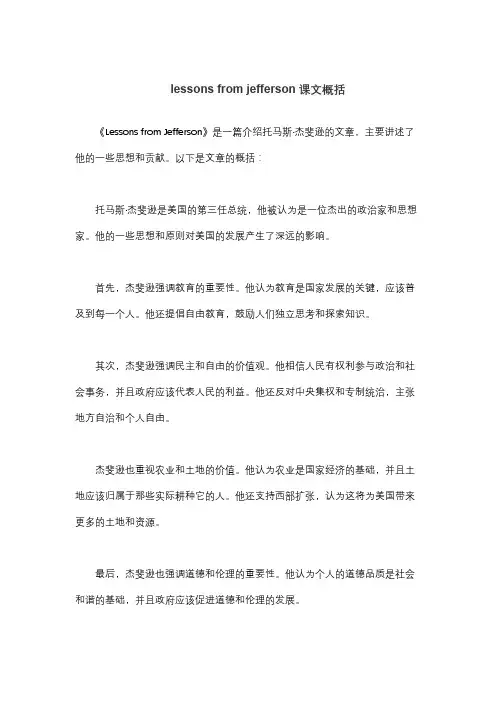
lessons from jefferson课文概括
《Lessons from Jefferson》是一篇介绍托马斯·杰斐逊的文章,主要讲述了他的一些思想和贡献。
以下是文章的概括:
托马斯·杰斐逊是美国的第三任总统,他被认为是一位杰出的政治家和思想家。
他的一些思想和原则对美国的发展产生了深远的影响。
首先,杰斐逊强调教育的重要性。
他认为教育是国家发展的关键,应该普及到每一个人。
他还提倡自由教育,鼓励人们独立思考和探索知识。
其次,杰斐逊强调民主和自由的价值观。
他相信人民有权利参与政治和社会事务,并且政府应该代表人民的利益。
他还反对中央集权和专制统治,主张地方自治和个人自由。
杰斐逊也重视农业和土地的价值。
他认为农业是国家经济的基础,并且土地应该归属于那些实际耕种它的人。
他还支持西部扩张,认为这将为美国带来更多的土地和资源。
最后,杰斐逊也强调道德和伦理的重要性。
他认为个人的道德品质是社会和谐的基础,并且政府应该促进道德和伦理的发展。
托马斯·杰斐逊的思想和贡献对美国的发展产生了深远的影响。
他的教育、民主、自由、农业、土地、道德等方面的思想至今仍然具有重要的指导意义。
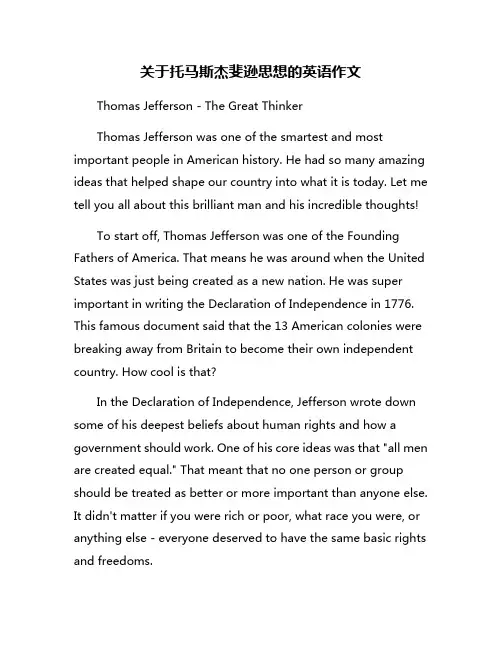
关于托马斯杰斐逊思想的英语作文Thomas Jefferson - The Great ThinkerThomas Jefferson was one of the smartest and most important people in American history. He had so many amazing ideas that helped shape our country into what it is today. Let me tell you all about this brilliant man and his incredible thoughts!To start off, Thomas Jefferson was one of the Founding Fathers of America. That means he was around when the United States was just being created as a new nation. He was super important in writing the Declaration of Independence in 1776. This famous document said that the 13 American colonies were breaking away from Britain to become their own independent country. How cool is that?In the Declaration of Independence, Jefferson wrote down some of his deepest beliefs about human rights and how a government should work. One of his core ideas was that "all men are created equal." That meant that no one person or group should be treated as better or more important than anyone else. It didn't matter if you were rich or poor, what race you were, or anything else - everyone deserved to have the same basic rights and freedoms.Another huge part of Jefferson's thinking was that people have certain "unalienable rights" that can never be taken away. These included the rights to life, liberty, and the pursuit of happiness. Jefferson felt very strongly that governments exist to protect these fundamental human rights, not to control or oppress people.Along with that, Jefferson believed that power should come from the consent of the governed. That meant the government could only have power if the people agreed to it and chose their own leaders through voting. He didn't think kings or queens should have total authority just because they were born into a royal family.So in his perfect vision, there would be a limited government that derived its power from the will of the people. The citizens would then be free to live their lives however they wanted, as long as they didn't violate the rights of others. Pretty revolutionary ideas at the time!Aside from politics and human rights, Jefferson also had a huge thirst for knowledge and science. He was incredibly curious about the world around him and loved learning new things. Jefferson was an inventor, architect, musician, linguist, and an expert on so many different subjects. They called him a true"Renaissance man" because he seemed to master every area he studied!One of the main ways Jefferson liked to gain knowledge was through reading books. He had an amazing personal library with thousands of books on topics ranging from philosophy and history to agriculture and construction. Jefferson would read for hours every day to expand his mind.Along with reading, Jefferson also believed strongly in education for children and citizens. He felt that having an educated population was vital for a democracy to survive and thrive. Jefferson even founded the University of Virginia and designed its beautiful buildings and grounds himself.Another area where Jefferson made major contributions was in protecting religious freedom. Since America was founded by people seeking freedom to practice their own faiths, Jefferson felt very strongly that the government should never favor one religion over others. He helped pass the Virginia Statute for Religious Freedom which stopped the government from forcing any particular religious beliefs or practices on citizens.As you can probably tell, Thomas Jefferson had a brilliant mind full of enlightened ideas that were truly ahead of their time. His core principles of human equality, unalienable rights, limitedgovernment power, and freedom of religion became essential parts of the foundation for American democracy.At the same time, it's important to note that Jefferson also had some major flaws and contradictions when it came to living up to his own lofty ideals. Most significantly, even though he spoke of human equality, Jefferson was a lifelong slaveholder who owned hundreds of enslaved African people and didn't make any efforts to free them.So while Jefferson brilliantly envisioned liberty and rights for American citizens, he clearly did not apply those same principles to the enslaved people who made his luxurious lifestyle possible. His beautiful words about equality sadly did not match his own actions and participation in the cruel system of slavery.Despite his glaring inconsistencies though, there is no doubt that Thomas Jefferson's revolutionary way of thinking had an enormous positive impact in shaping American values of freedom, democracy, and individual rights. His powerful words and persuasive ideas lit a spark that helped inspire people all over the world to fight for life, liberty, and the pursuit of happiness.Nearly 250 years after the birth of the United States, we still look to the ambitious vision of Thomas Jefferson as a guidinglight for achieving a more perfect union of truly equal rights and opportunities for all people. He was most certainly one of the great thinkers and dreamers in human history.。
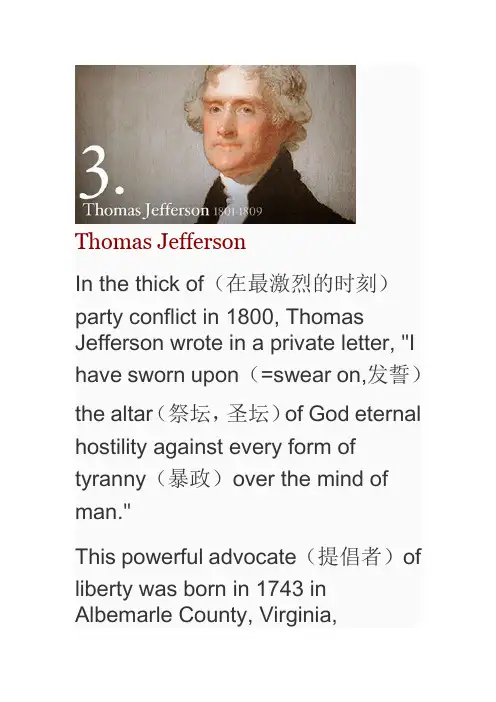
Thomas JeffersonIn the thick of(在最激烈的时刻)party conflict in 1800, Thomas Jefferson wrote in a private letter, "I have sworn upon(=swear on,发誓)the altar(祭坛,圣坛)of God eternal hostility against every form of tyranny(暴政)over the mind of man."This powerful advocate(提倡者)of liberty was born in 1743 in Albemarle County, Virginia,inheriting from his father, a planter and surveyor, some 5,000 acres of land, and from his mother, a Randolph, high social standing. He studied at the College of William and Mary, then read law. In 1772 he married Martha Wayles Skelton, a widow, and took her to live in his partly constructed mountaintop home, Monticello.(蒙蒂赛洛,美国地名)Freckled(有雀斑的)andsandy-haired, rather tall and awkward, Jefferson was eloquent (口才好的)as a correspondent,(通讯记者)but he was no public speaker. In the Virginia House of Burgesses and the Continental Congress, he contributed his penrather than his voice to the patriot cause. As the "silent member" of the Congress, Jefferson, at 33, drafted the Declaration of Independence. In years following he labored to make its words a reality in Virginia. Most notably(尤其),he wrote a bill(法案)establishing religious freedom,enacted(制定,颁布)in 1786. Jefferson succeeded(继承)Benjamin Franklin as minister to France in 1785. His sympathy for the French Revolution led him into conflict with Alexander Hamilton when Jefferson was Secretary of State in President Washington's Cabinet.(内阁)He resigned in 1793.Sharp political conflict developed, and two separate parties, the Federalists and theDemocratic-Republicans, began to form. Jefferson gradually assumed leadership of the Republicans, who sympathized with the revolutionary cause in France. Attacking Federalist policies, he opposed a strong centralized Government and championed(支持)the rights of states.As a reluctant(勉强的,不情愿的)candidate for President in 1796, Jefferson came within three votes of election. Through a flaw(瑕疵,缺陷)in the Constitution, he became Vice President, although an opponent(对手,反对者)ofPresident Adams. In 1800 the defect(缺陷)caused a more seriousproblem. Republican electors(选民)attempting to name both a President and a Vice President from their own party, cast a tie(不分胜负,打成平局)vote between Jefferson and Aaron Burr. The House of Representatives (美国众议院)settled the tie. Hamilton, disliking both Jefferson and Burr, nevertheless urged Jefferson's election.When Jefferson assumed the Presidency, the crisis in France had passed. He slashed(削减)Armyand Navy expenditures(开支), cutthe budget(预算), eliminated the tax on whiskey so unpopular in the West, yet reduced the national debt by a third. He also sent a naval squadron(中队,舰队)to fight theBarbary pirates(巴巴里海盗), whowere harassing(反复袭击)American commerce in the Mediterranean. Further, although the Constitution made noprovision(供给品) for the acquisition of new land, Jefferson suppressed(克制,抑制) his qualms (良心之谴责,不安)over constitutionality(符合宪法)when he had the opportunity to acquire the Louisiana Territory from Napoleon in 1803.During Jefferson's second term, he was increasingly preoccupied with (沉浸在)keeping the Nation from involvement in the Napoleonic wars, though both England and France interfered with(干涉,妨碍)the neutral rights of American merchantmen(商船,商人). Jefferson's attempted solution, an embargo upon(实行禁运)American shipping, worked badly and was unpopular.Jefferson retired to Monticello to ponder(考虑)such projects as his grand designs(宏大计划,宏伟设计)for the University of Virginia. A French nobleman observed that he had placed his house and his mind"on an elevated(高尚的)situation, from which he might contemplate the universe."He died on July 4, 1826.。
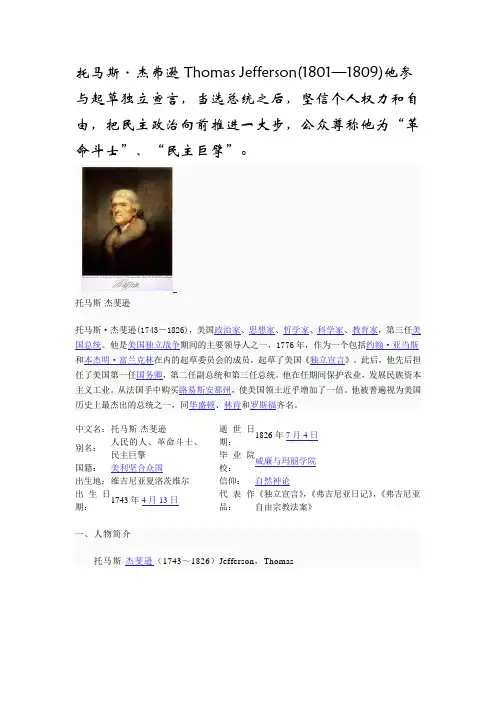
中文名: 托马斯·杰斐逊别名:人民的人、革命斗士、民主巨擎国籍: 美利坚合众国 出生地: 维吉尼亚夏洛茨维尔出生日期:1743年4月13日逝世日期: 1826年7月4日 毕业院校: 威廉与玛丽学院 信仰: 自然神论 代表作品: 《独立宣言》,《弗吉尼亚日记》,《弗吉尼亚自由宗教法案》一、人物简介托马斯·杰斐逊(1743~1826)Jefferson ,Thomas总统(1801~1809)。
1743年4的东西了。
这样一个小箱子,两百年前就相当于今日功能齐全的手提电脑。
思考与启迪这些小玩艺儿,现在我们看来都很简单,不值一提。
它们的意义在于,它们说明了美国立国先贤们对创新之重要性的认识。
杰弗逊和华盛顿总统,是对创新发明非常重视的第一代开国者。
在美国革命的动荡岁月里,两个人都没忘记抽空向英国和欧洲大陆订购花种、菜子,写信给家里关照不要错过了播种新品种的季节。
两个人对于新品种都有异乎寻常的热情,退休以后回到家,都一头扎到田间草地,侍弄新鲜花草。
杰斐逊还改良了一种犁铧,得到过国际组织嘉奖。
当华盛顿担任美国第一任总统的时候,他请杰斐逊担任国务卿。
那个时候,世界上最强大的是英国,制造业中心在英国和欧洲大陆,美国只是偏远落后的农林产品输出地,向欧洲出口棉花,木材,烟草,大米,羊毛,几乎所有工业制品都从欧洲进口。
第一代美国领袖知道,虽然美国有资源,但是如果它不制造,它就永远不是一个强国。
谁制造谁强大,是工业革命时代的铁律。
为此,美国必须广罗技术人才,有人才才会有自己的制造业。
从此开创了美国特别优待技术人才的传统。
至今为止,美国人有一个不成文的共识:美国必须是全世界给人才以最好条件的地方。
什么地方给人才的条件比美国好,美国肯定会提出更好的条件,超过那个地方。
1790年,华盛顿就任总统的第二年,他就让杰斐逊尽快确立专利保护制度。
就在华盛顿总统任内,杰斐逊一手操办,美国通过了保护创新和发明的专利法,从此美国成为世界上保护创新最严格的地方。
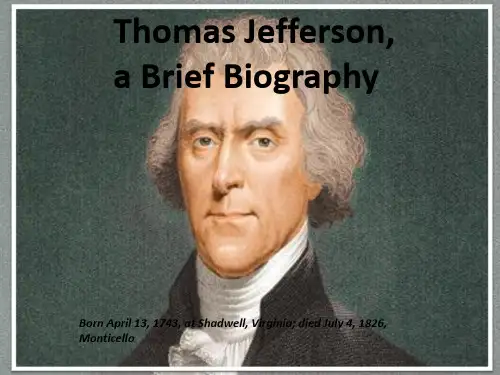
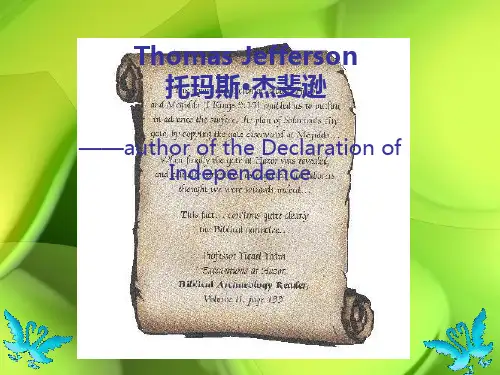
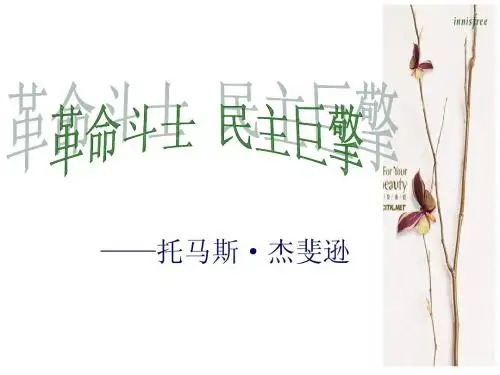
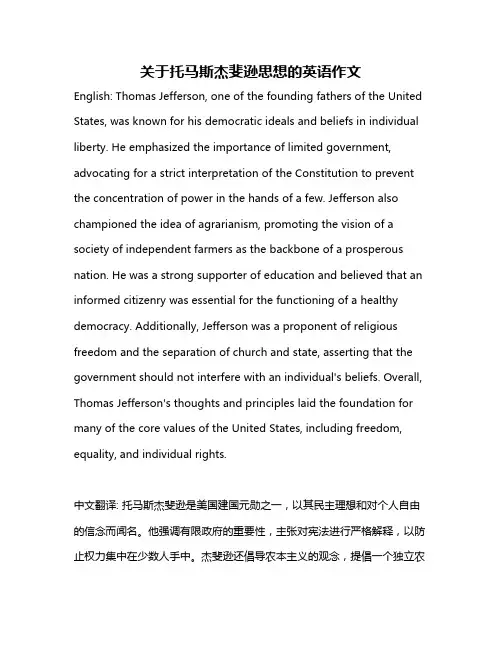
关于托马斯杰斐逊思想的英语作文English: Thomas Jefferson, one of the founding fathers of the United States, was known for his democratic ideals and beliefs in individual liberty. He emphasized the importance of limited government, advocating for a strict interpretation of the Constitution to prevent the concentration of power in the hands of a few. Jefferson also championed the idea of agrarianism, promoting the vision of a society of independent farmers as the backbone of a prosperous nation. He was a strong supporter of education and believed that an informed citizenry was essential for the functioning of a healthy democracy. Additionally, Jefferson was a proponent of religious freedom and the separation of church and state, asserting that the government should not interfere with an individual's beliefs. Overall, Thomas Jefferson's thoughts and principles laid the foundation for many of the core values of the United States, including freedom, equality, and individual rights.中文翻译: 托马斯杰斐逊是美国建国元勋之一,以其民主理想和对个人自由的信念而闻名。
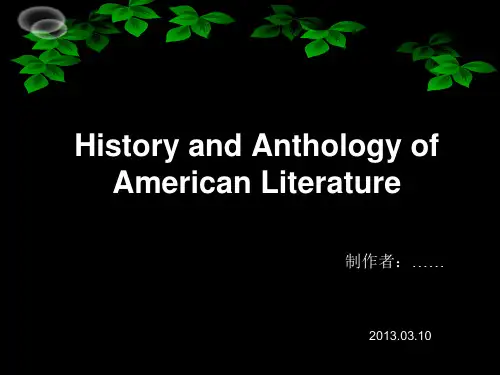

中文名: 托马斯·杰斐逊别名:人民的人、革命斗士、民主巨擎国籍: 美利坚合众国 出生地: 维吉尼亚夏洛茨维尔出生日期:1743年4月13日逝世日期: 1826年7月4日 毕业院校: 威廉与玛丽学院 信仰: 自然神论 代表作品: 《独立宣言》,《弗吉尼亚日记》,《弗吉尼亚自由宗教法案》一、人物简介托马斯·杰斐逊(1743~1826)Jefferson ,Thomas总统(1801~1809)。
1743年4的东西了。
这样一个小箱子,两百年前就相当于今日功能齐全的手提电脑。
思考与启迪这些小玩艺儿,现在我们看来都很简单,不值一提。
它们的意义在于,它们说明了美国立国先贤们对创新之重要性的认识。
杰弗逊和华盛顿总统,是对创新发明非常重视的第一代开国者。
在美国革命的动荡岁月里,两个人都没忘记抽空向英国和欧洲大陆订购花种、菜子,写信给家里关照不要错过了播种新品种的季节。
两个人对于新品种都有异乎寻常的热情,退休以后回到家,都一头扎到田间草地,侍弄新鲜花草。
杰斐逊还改良了一种犁铧,得到过国际组织嘉奖。
当华盛顿担任美国第一任总统的时候,他请杰斐逊担任国务卿。
那个时候,世界上最强大的是英国,制造业中心在英国和欧洲大陆,美国只是偏远落后的农林产品输出地,向欧洲出口棉花,木材,烟草,大米,羊毛,几乎所有工业制品都从欧洲进口。
第一代美国领袖知道,虽然美国有资源,但是如果它不制造,它就永远不是一个强国。
谁制造谁强大,是工业革命时代的铁律。
为此,美国必须广罗技术人才,有人才才会有自己的制造业。
从此开创了美国特别优待技术人才的传统。
至今为止,美国人有一个不成文的共识:美国必须是全世界给人才以最好条件的地方。
什么地方给人才的条件比美国好,美国肯定会提出更好的条件,超过那个地方。
1790年,华盛顿就任总统的第二年,他就让杰斐逊尽快确立专利保护制度。
就在华盛顿总统任内,杰斐逊一手操办,美国通过了保护创新和发明的专利法,从此美国成为世界上保护创新最严格的地方。
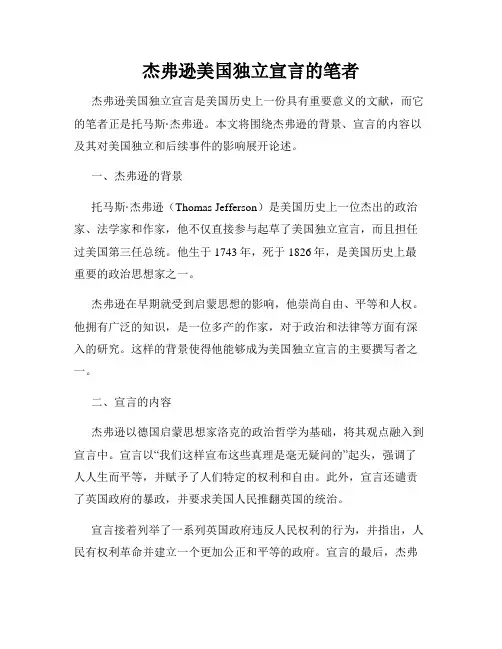
杰弗逊美国独立宣言的笔者杰弗逊美国独立宣言是美国历史上一份具有重要意义的文献,而它的笔者正是托马斯·杰弗逊。
本文将围绕杰弗逊的背景、宣言的内容以及其对美国独立和后续事件的影响展开论述。
一、杰弗逊的背景托马斯·杰弗逊(Thomas Jefferson)是美国历史上一位杰出的政治家、法学家和作家,他不仅直接参与起草了美国独立宣言,而且担任过美国第三任总统。
他生于1743年,死于1826年,是美国历史上最重要的政治思想家之一。
杰弗逊在早期就受到启蒙思想的影响,他崇尚自由、平等和人权。
他拥有广泛的知识,是一位多产的作家,对于政治和法律等方面有深入的研究。
这样的背景使得他能够成为美国独立宣言的主要撰写者之一。
二、宣言的内容杰弗逊以德国启蒙思想家洛克的政治哲学为基础,将其观点融入到宣言中。
宣言以“我们这样宣布这些真理是毫无疑问的”起头,强调了人人生而平等,并赋予了人们特定的权利和自由。
此外,宣言还谴责了英国政府的暴政,并要求美国人民推翻英国的统治。
宣言接着列举了一系列英国政府违反人民权利的行为,并指出,人民有权利革命并建立一个更加公正和平等的政府。
宣言的最后,杰弗逊明确指出,美国独立是一项正当的行动,并宣布美国与英国彻底分离,成为独立的主权国家。
三、宣言的影响杰弗逊美国独立宣言的影响深远,不仅对当时的美国独立战争产生了重大影响,而且对后来的世界历史产生了深远的影响。
首先,宣言将自由、平等和人权的思想写入正式文件,成为美国价值观的基石。
它提供了一个理论基础,为美国独立战争提供了动力和合法性。
其次,宣言的内容激发了美国人民的爱国热情,团结了起来,为脱离英国的统治进行了长期的斗争。
宣言的宣布将美国确立为一个独立国家,同时也为其他殖民地的独立运动提供了激励和指导。
此外,宣言中关于自由和人权的论述,对于后来世界范围的人权运动产生了重大的影响。
宣言强调人们的自由和平等权利,成为世界其他国家争取自由独立和民主的范例。
托马斯杰弗逊托马斯·杰弗逊(Thomas Jefferson)是美国历史上的一位杰出政治家、学者和发明家,也是美国第三任总统。
他在美国独立运动中扮演了重要角色,对于美国的政治、法律和教育制度的发展做出了深远的影响。
本文将从托马斯·杰弗逊的早年生活到他在总统职位上的贡献等方面介绍他的生平事迹。
托马斯·杰弗逊于1743年4月13日在美国弗吉尼亚殖民地的一个种植园主家庭中出生。
他在家庭中接受了良好的教育,并于1760年进入威廉与玛丽学院学习。
在学院期间,他广泛涉猎了文学、科学、哲学等领域的知识,并养成了批判性思维和领导才能。
毕业后,杰弗逊开始了他的法律职业之路,并迅速在弗吉尼亚的法律界崭露头角。
他热衷于学习法律,深谙英国法律体系,但同时也积极关注当时美国殖民地面临的政治问题。
他在1769年进入弗吉尼亚的殖民立法机关参与政治活动,对于殖民地拥有更多权力和自主决策的主张表达了坚定的支持。
1775年,杰弗逊参与了起草《独立宣言》的工作。
他与本杰明·富兰克林等人合作,共同起草了这一具有历史意义的文件,宣布了美国殖民地与英国帝国的分离,并阐述了个人与政府之间的权利和义务关系。
《独立宣言》成为了美国独立运动的重要里程碑,对于后来的美国宪法和法律体系的建立产生了重要影响。
在独立战争期间,杰弗逊担任了弗吉尼亚州的州长,并积极参与战争努力。
他在1779年辞去州长职务,回到地产,并开始撰写《弗吉尼亚宗教自由法案(Virginia Statute for Religious Freedom)》,提出了宗教信仰自由的观念,并在1786年成功推动该法案获得通过。
这一法案为美国宪法第一修正案中保护宗教自由的条款打下了基础。
1789年,杰弗逊被乔治·华盛顿总统任命为国务卿。
在这一职位上,他主张以中立和非干预的立场处理国际事务,并与法国进行了关键的外交谈判。
他的外交努力为美国和法国之间的友好关系奠定了基础,同时也为美国的独立地位和国际声望做出了重要贡献。
托马斯·杰斐逊思想总结英语作文Thomas Jefferson - A Great Thinker and LeaderThomas Jefferson was one of the most important people in the history of the United States. He was the third President, but even before that he did many amazing things that helped shape our country.One of Jefferson's biggest achievements was helping to write the Declaration of Independence. This was the document that declared the United States as a free and independent nation, separate from Britain. Jefferson wrote the famous lines "We hold these truths to be self-evident, that all men are created equal, that they are endowed by their Creator with certain unalienable Rights, that among these are Life, Liberty and the pursuit of Happiness."Those words mean that all people have basic rights simply because they are human beings. No government can take those rights away. The ideas of freedom, equality, and human rights came from Jefferson's mind and pen.Even after the American Revolution was won, Jefferson kept contributing great ideas. As the first Secretary of State, he promoted religious freedom and the separation of church andstate. He believed the government should treat all religions equally and fairly.Later, as the third President from 1801 to 1809, Jefferson doubled the size of the United States through the Louisiana Purchase. For just a few cents per acre, he bought a huge amount of land from France, extending America all the way to the Rocky Mountains. Without Jefferson's vision, our country may have stayed small and surrounded by French and British territories.In addition to being a great political leader, Jefferson was a true Renaissance man - someone with expertise in many different areas. He was a gifted architect who designed buildings like his home Monticello. He was an inventor who created neat gadgets like a swivel chair, a folding ladder, and a macaroni machine. He loved science and nature, sending explorers like Lewis and Clark on expeditions to study plants, animals, and geography.Jefferson also founded the University of Virginia and designed its buildings and curriculum himself. He believed education was crucial for people to become good citizens. He said, "If a nation expects to be ignorant and free, in a state of civilization, it expects what never was and never will be." In other words, an educated population is required for a free society.Despite all his accomplishments, Jefferson also had flaws. He owned slaves for most of his life, despite calling slavery an "abominable crime." He didn't free his slaves until his death, which seems contradictory to his ideals of liberty and equality. However, Jefferson's overall legacy and impact on shaping American values of freedom, democracy, and human rights is undeniable.In my opinion, Thomas Jefferson was one of the greatest thinkers and statesmen in American history. His words and actions advocating for liberty, equality, education, and westward expansion helped establish the United States and its core values. While not a perfect person, Jefferson's vision and leadership fundamentally shaped the nation we live in today. We should remember his famous statement that "All men are created equal" and continue striving to make that ideal a reality.。
托福阅读常考的人物话题1、托马斯·杰斐逊(Thomas Jefferson)美国的第三任总统托马斯·杰斐逊是美国独立运动的领导者之一,是《独立宣言》(Declaration of Independence)的起草者。
除了政治活动,杰斐逊还有着渊博的才学和广乏的爱好,他拥有建筑学家、考古学家、古生物学家、作家和弗吉利亚大学创办人等多个头旨,是一个才学非常出众的人。
2、本杰明·富兰克林( Benjamin Franklin)美国的开国元勋之一,本杰明·富兰克林是一位对一切事物都充满好奇、在诸多领域都颇譬建树的人。
他是一位重要的科学家、发明家,也是一位政治活动家。
本杰明·富兰克林为睫国的发展作出了巨大贡献,在独立战争期间他还发挥了杰出外交官的作用。
3、弗兰克·劳埃德·赖特(Frank Lloyd Wright)弗兰克·劳埃德·赖特是20世界中期最具影响力、最知名的建筑师。
他创造了独具特色的毫筑风格。
直到现在,他的杰作之一螺旋形的古根海姆博物馆( Guggenheim Museum,1959) 两碍到人们的广泛认可。
他的建筑风格非常独特,就像人们在他设计的“草原式住宅”中看到的,他对空间进行了融例的处理,让人感觉建筑空间在向各个方向延伸,整体外形就像是和地平线融为了一体。
融盼建筑就是如此不凡,做到和谐统一的同时又颇具独创性。
4、埃德温.P.哈勃(Edwin P.Hubble)美国天文学家埃德温.P.哈勃发现了宇宙在不断地膨胀,著名的哈勃望远镜就是以其名命酝的。
哈勃望远镜于1990年4月随美国发现号飞船一起进入地球上空610千米高的轨道,嘲哈执行对宇宙空间的观测任务。
哈勃望远镜是由美国宇航局和欧洲宇航局共同开发成功的目以在大气层之外对宇宙活动进行精密的观测。
隆哈勃望远镜的观测成果:哈勃望远镜在天文学史上留给人们最具代表性的成果是1994 酵对苏梅克列维九号彗星和木星相撞过程的观测并发现了银河系中心地巨大黑洞,以及对星巨相撞轨迹的观测和以该观测为基础、推测出宇宙间有1200亿个星系、宇宙年龄为130-150 醉。
关于托马斯·杰佛逊的名人故事范文1:托马斯·杰佛逊——美国战斗的先驱者托马斯·杰佛逊(Thomas Jefferson)是美国历史上的重要人物,他不仅是美国独立宣言的起草人之一,也是美国第三任总统。
他的一生充满了战斗精神,为美国建国做出了卓越的贡献。
托马斯·杰佛逊生于1743年,成长于独立自由的时代背景下。
他年轻时就受到了加尔文主义的影响,对人民自由权利的渴求一直激励着他。
在美国独立战争时期,杰佛逊的贡献不可小觑。
他在大陆会议上担任重要角色,成功地推动了独立宣言的制定并为其作出了贡献。
他还是独立战争中的一位勇敢的军人,积极地为美国国家的独立和荣耀而战斗。
他用自己的实际行动,诠释了美国的价值观和信仰。
作为美国最伟大的领导人之一,杰佛逊创造了欣欣向荣的美国,并为后人留下了重要的研究思想。
他十分重视教育事业,倡导种植自己的园林和慷慨地捐助图书馆,他认为知识和教育是社会进步的基础。
他还是一位卓越的科学家和学者,使用科学方法并通过自己种植的葡萄园进行农业改良,提高农作物品质和产量。
总之,杰佛逊的一生演绎着战斗的精神和不断创新的精神,在美国建国过程中做出了杰出的贡献,他的形象也深入人心,成为美国历史的重要组成部分。
写作重点:本文主要介绍了托马斯·杰佛逊的生平和贡献,重点突出其在美国建国过程中的突出贡献,包括对独立宣言的贡献、对独立战争的贡献、对教育和科学的推动。
同时,用语清晰简单,层次分明,刻画了一个充满战斗和创新精神的历史人物形象。
范文2:托马斯·杰佛逊——自由的倡导者托马斯·杰佛逊是美国历史上最伟大的政治家之一,亦是“独立宣言”的主要起草人之一。
他的一生专注于为美国的自由事业而奋斗,为人类自由事业的发展做出了重要的贡献。
杰佛逊的贡献可以从多个层面来看。
首先,在1783年的《巴黎条约》中,他极力争取奖励法国对英国的战争,以帮助法国获得美国独立战争中对英国的胜利,同时他也为后来与法国的友谊发展做出了重要的贡献。